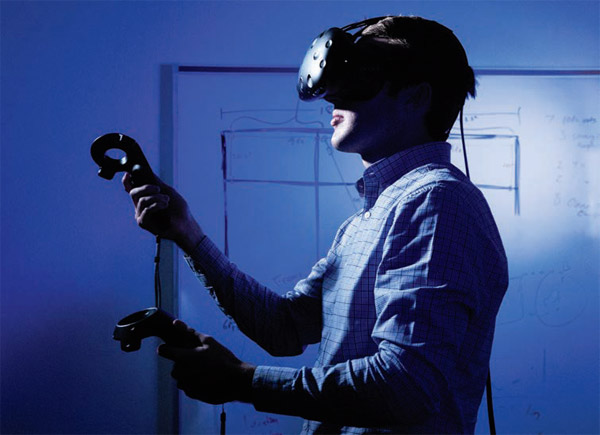Aerospace giant Lockheed Martin has awarded a research grant to Brigham Young University to apply gaming technology to develop aspects of a virtual reality (VR) training and design review system. The collaboration will develop a system allowing users to interact with, record and share engineering designs in virtual reality.
The grant was awarded to the BYU Department of Mechanical Engineering with the goal of advancing Lockheed Martin’s digital engineering capabilities. BYU engineering student and Lockheed Martin intern Jeffery Smith helped facilitate a virtual reality research partnership between the company’s Collaborative Human Immersive Lab (CHIL) and BYU. The lab is in Denver.
Smith, a senior majoring in mechanical engineering, calls the project an “all-inclusive sensory experience.” He believes the finished project will enable engineers to transfer their skills into the real world faster and more accurately than current training methods.
“The BYU students created an impressive demo of the VR system that really highlights the potential of this technology, even in its early stages,” said Darin Bolthouse, manager of Lockheed Martin's Denver facilty. “Their work will help us learn from and share experiential 3D imagery in every stage of product development, from engineering design and manufacturing to operations and sustainment.”
The system will leverage immersive 3D technology for design efficiency, collaboration and training and will allow the company to identify potential challenges during development before they manifest in the manufacturing or sustainment process. Ultimately, VR engineering saves millions of dollars by avoiding extra design and build time.
The initial research period concludes in March, and Lockheed Martin and BYU are discussing options to continue the virtual reality research partnership, as well as pursue additive manufacturing research opportunities.
Virtual reality and additive manufacturing are elements of Lockheed Martin’s Digital Tapestry approach, which employs modern digital technology to seamlessly connect conceptualization, design, verification, manufacturing and sustainment. The company applies the Digital Tapestry to a variety of projects, from interplanetary spacecraft to missile development programs.
The Digital Tapestry will also play a prominent role in a new Lockheed Martin Ground Based Strategic Deterrent (GBSD) program, which will be headquartered at the Falcon Hill National Aerospace Research Park at Hill Air Force Base. The GBSD is a competition to replace the Air Force’s Minuteman III intercontinental ballistic missile (ICBM) system with a modern and capable integrated weapon system. The program’s base is currently under construction at Hill AFB.
“With VR and the high-tech laboratory space we are building in Utah, our customers will be able to experience our designs virtually with greater fidelity than we’ve ever had before,” said John Karas, Lockheed Martin vice president and Ground Based Strategic Deterrent program manager.
Headquartered in Bethesda, Maryland, Lockheed Martin is a global security and aerospace company that employs approximately 97,000 people worldwide and is principally engaged in the research, design, development, manufacture, integration and sustainment of advanced technology systems, products and services.








